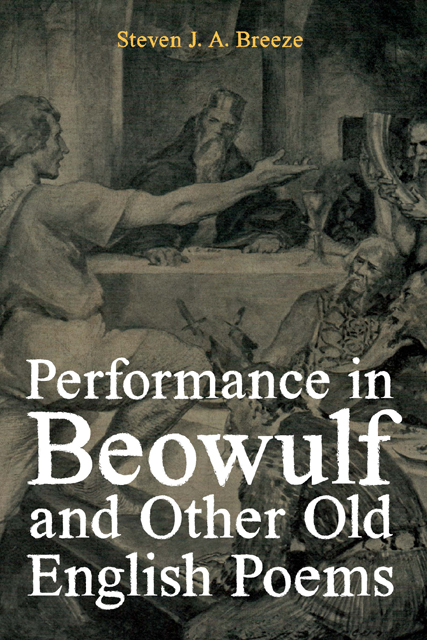Book contents
- Frontmatter
- Dedication
- Contents
- List of Illustrations and Tables
- Acknowledgements
- List of Abbreviations
- Poem Titles, Orthography, Editions, and Translations
- Introduction: Realising the Intangible
- 1 Instruments of the Poet: Exploiting the Old English Lexis
- 2 Multiformity and the Orality of Associative, Architectonic Poetics
- 3 Providence and Pleasure: Performance as Symbol
- 4 Storytelling in Beowulf and Meta-storytelling in Andreas
- 5 Wisdom and Power: Philosophies of Performance
- 6 Theme Songs: An English Tradition of Performance?
- 7 The Lure of the Lyre: Interpretation, Reenactment, and the Corpus
- Conclusion: ‘Poetic Performance’
- Bibliography
- Index
- Anglo-Saxon Studies
1 - Instruments of the Poet: Exploiting the Old English Lexis
Published online by Cambridge University Press: 20 December 2022
- Frontmatter
- Dedication
- Contents
- List of Illustrations and Tables
- Acknowledgements
- List of Abbreviations
- Poem Titles, Orthography, Editions, and Translations
- Introduction: Realising the Intangible
- 1 Instruments of the Poet: Exploiting the Old English Lexis
- 2 Multiformity and the Orality of Associative, Architectonic Poetics
- 3 Providence and Pleasure: Performance as Symbol
- 4 Storytelling in Beowulf and Meta-storytelling in Andreas
- 5 Wisdom and Power: Philosophies of Performance
- 6 Theme Songs: An English Tradition of Performance?
- 7 The Lure of the Lyre: Interpretation, Reenactment, and the Corpus
- Conclusion: ‘Poetic Performance’
- Bibliography
- Index
- Anglo-Saxon Studies
Summary
Because of performance’s intangibility, descriptors relating to it are imprecise, and interpreting any textual reference to performance entails the potential for loss or modification of meaning. For example, Beowulf 1063a reads þær wæs sang ond sweg, which can be translated as ‘there was song and music’ with little reservation. However, even if this translation is fundamentally acceptable, it is unclear whether the concepts indicated by sang and sweg were the same for the poet as they are for a modern reader. Indeed, they are likely not to have been. The Modern English reflex of sang is ‘song’, but sang could refer to a concept as general as ‘noise’ or as specific as ‘psalm’, and we do not know whether certain performance material or a particular mode is intended. Poetic creativity also needs to be acknowledged: in Beowulf, Grendel’s wail of defeat is described as a sigeleasne sang, ‘victoryless song’ (787a), yet he is unlikely to have sung of his demise! Speaking of the Beowulf poet’s performance mode, Roberta Frank points out that ‘[his] depiction of two anonymous Danish scops reciting stories from Germanic legend (853– 97, 1068–159) indicates only that one Englishman, in whatever century he lived, believed that sixth-century Danes were likely to behave that way, not that song was his medium of exchange.’ Things are even less certain: we do not know whether song is the ‘medium of exchange’, the mode, being depicted in these instances from Beowulf. As Frank possibly unwittingly infers, they could refer to spoken recitals. Indeed, the performance mode is likely to be spoken storytelling in both passages that Frank refers to. Moreover, just before Grendel’s wail of defeat, the poet states that sweg up astag, ‘a music arose’ (782), also referring to Grendel’s cries. Although certain sections of early medieval English society had the use of Latin and thus the term musica, Old English, like many world languages, did not have a cognate for Modern English ‘music’, which entered the language in the Middle English period. A modern reader is thus unable to ascertain with confidence that an Old English identifier for performance refers to a song, story, poem, piece of music, or some combination of these elements. As this chapter intends to show, such issues of interpretation and classification extend to vocabulary relating to performers and their instruments.
- Type
- Chapter
- Information
- Performance in Beowulf; and other Old English Poems , pp. 35 - 73Publisher: Boydell & BrewerPrint publication year: 2022

